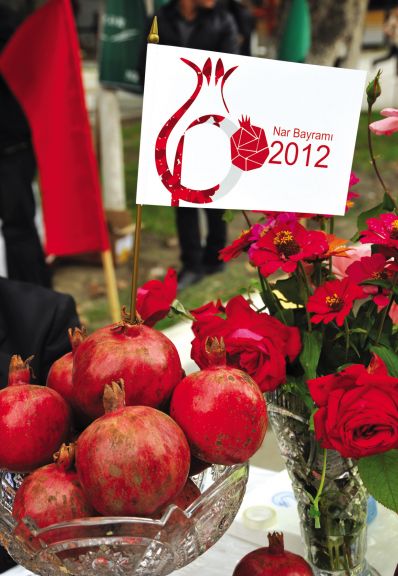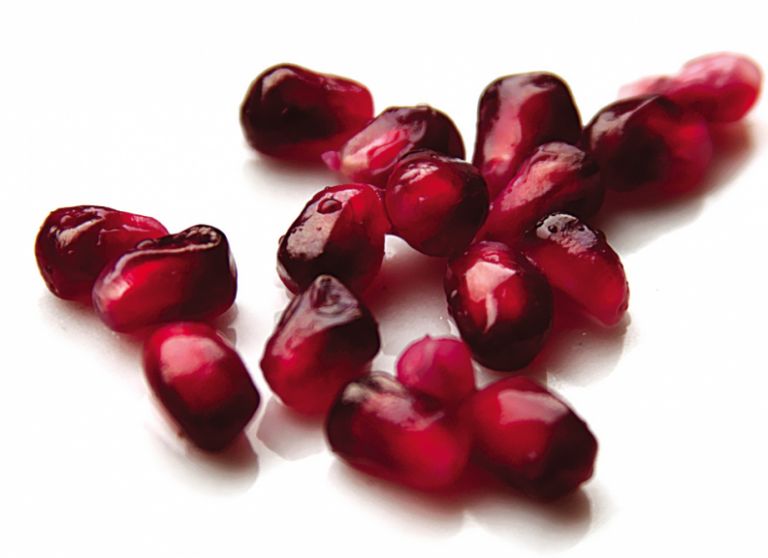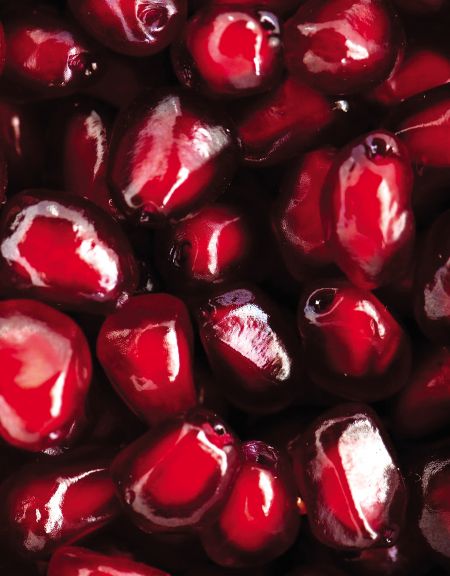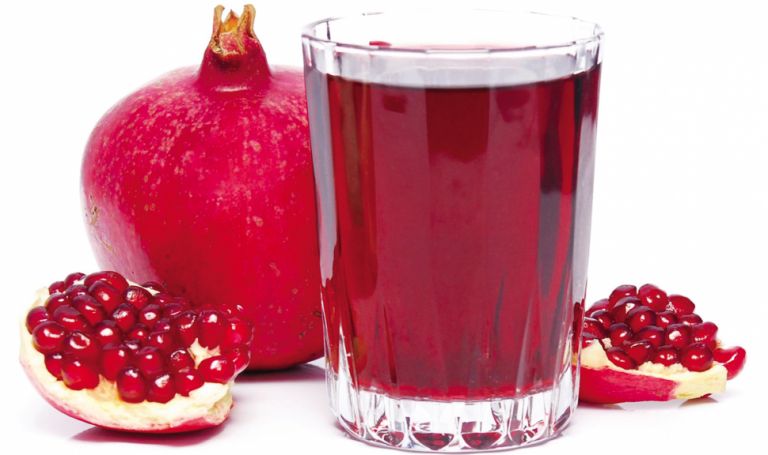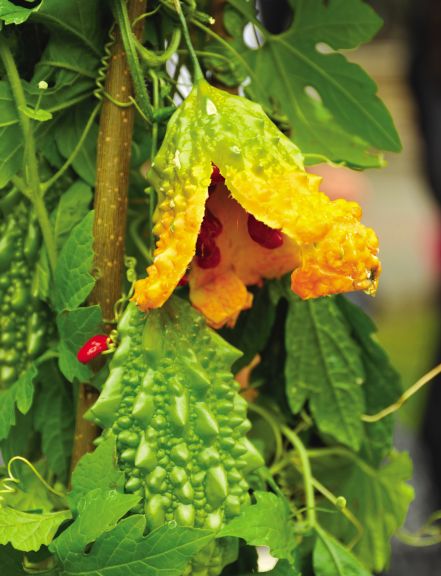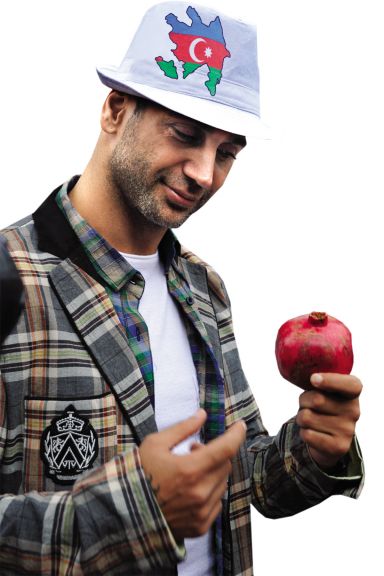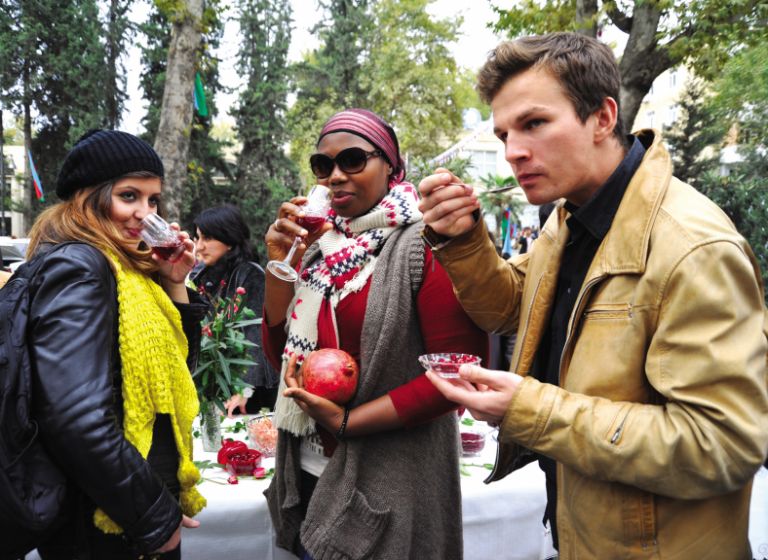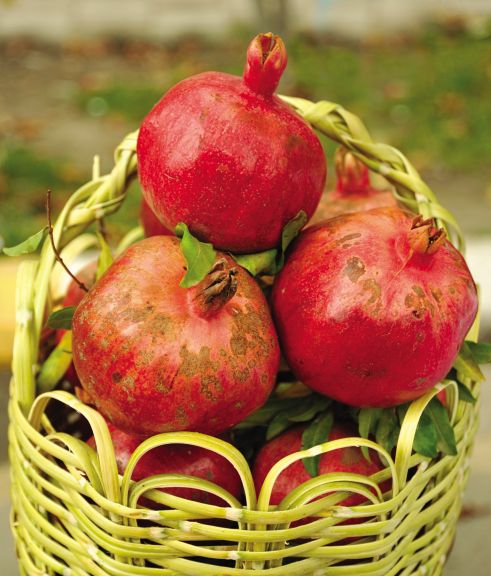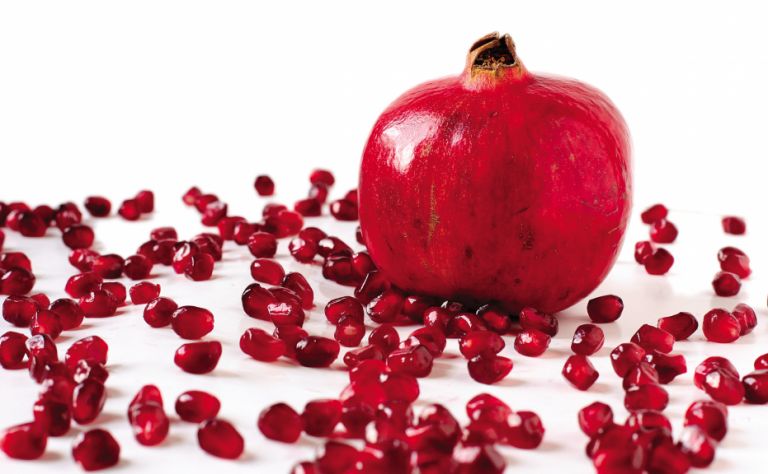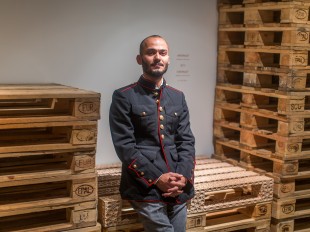In the East, the pomegranate has been considered the king of fruits from the earliest of times. This may arise from the original shape of its sepals which form a ‘crown’. It is even believed that the pomegranate may have given people the idea of the crown for a king.
Festival
The fruit is native to Persia. The Moors brought the pomegranate to Spain around 800 BC and King Henry VIII was responsible for its arrival in Britain, but it is still not as popular as in the East. It is especially respected and loved in Azerbaijan where there is an annual pomegranate festival in late autumn – harvest-time. They are grown in all areas of the country; however, the best ones grow in Goychay, regarded as the fruit’s natural motherland and home to the festival. This year’s festival was in early November. The weather was fine and the streets of Goychay were bedecked in holiday mood.
70 kinds of pomegranate
In its 7th year, the festival attracts many tourists and other visitors. They were invited to test the fruit and its jams and juice at every table the hosts had set up along the main street. In all, around 70 kinds of pomegranate grow in Goychay and up to 40 of them were represented. The best known are the Gulovsha and Bala Mursel from Bigir and Garapaggal, just two of the 32 villages taking part.
Our trees are thought to be the oldest and most fruitful. They have been grown in our region for 700 years. We take care of them because pomegranate cultivation is our living. Many of our farmers export their fruit to Russia and some European countries. A pomegranate from Goychay is very succulent and tasty – Shikhverdi Bekhbudov, a farmer from Bigir village.
A magic potion
We should mention that the juice of the pomegranate is a very healthy, tasty product. It is helpful for diabetics and people who suffered from anaemia. We were told that a glass of pomegranate juice every day will help you withstand all illnesses as every farmer offered visitors a sample to test for themselves the value of his produce. Azerbaijanis also use the fruit to make nar-sherab, a special sauce which accompanies many dishes in the national cuisine; it goes especially well with fish. The people of Goychay also make a jam called nardancha to eat with ash, the Azerbaijani pilaf.
Artistic inspiration
You will have gathered by now that it is a much respected fruit and it carries symbolic meaning in this society. So it has inspired many works of art, poems and songs. But Goychay’s special affection has a material basis, too. Pomegranate cultivation is an economically profitable area. Last year the region harvested 38,000 tons of pomegranates. This year there were more.
Thus the main purpose of the festival is to promote the region, showcasing its cultural, social and economic potential and tourism.
Pomegranate pizza
Each year the festival devises new competitions based on the fruit. This time a pizza contest awaited. Cooked directly on the street, the pizza included grains, among other ingredients. It looked delicious and went down very well with guests as they also surveyed an enormous pomegranate pizza. There were many other competitions, including the now traditional biggest pomegranate and the rather messy juice squeezing race (by hand!) By the way, this year’s largest fruit weighed 1,425 grams. There was even medical advice on hand from doctors who offered information about the use of pomegranate juice and peel in the treatment of 20 illnesses.
Special guest from Turkey
This special event continued with a concert by some 30 well-known artists and talented young singers. A highlight was the performance of Turkish star Dogush.
White pomegranate in special demand
It was pleasing to see that alongside government representatives, diplomats and high-level guests there were students local and foreign enjoying the event. Hadi, a Gambian student at the Azerbaijan Diplomatic Academy, said that pomegranates are also grown in her homeland, but not in such great variety.
I have learned many things about the pomegranate from this festival. So many dishes, juices and jams can be made from the fruit. It’s amazing!
Indeed, there were dozens of kinds of pomegranate, of different size, colour and taste. The Korean Ambassador, Choi Suk-inn, who had also been invited to the event said that he liked many kinds, but his favourite was the white one.
I really liked the festival. It’s the first time I’ve attended an event dedicated to the pomegranate. As I see, Azerbaijanis respect the fruit and value it highly. I liked the red ones, but most of all I like the white ones…Very delicious.
Decorative
Rafig Khalilov, a local entrepreneur, has been growing a special kind of pomegranate, called the Indian, for five years. At first sight it seems more decorative than useful; in reality, Mr Khalilov told us, the Indian sort has very important qualities.
Imagine, this kind of pomegranate is five times healthier than bananas. I brought this one from Turkey where I first saw it. It is believed to originate in India, hence its name. I already have 75 of these trees growing in my orchard at home. Doctors recommend it for all kinds of illnesses.
See you next year…
Foreign students taste the Goychay produce
It gets more delicious as you eat the Geychay pomegranate
And everywhere respects the Goychay pomegranate
This is a short extract from a meykhana (competitive poetic improvisation) sung by a special guest singer from Baku as he presented his musical gift to festival visitors and local residents. With him was another folk singer, a balladeer-like ashug, accompanied by his saz (long-necked lute) and delighting all. The festive was a success and Goychay residents were very happy with their celebration of local fruitfulness. See you next year, was the wish as their guests departed.
Festival
The fruit is native to Persia. The Moors brought the pomegranate to Spain around 800 BC and King Henry VIII was responsible for its arrival in Britain, but it is still not as popular as in the East. It is especially respected and loved in Azerbaijan where there is an annual pomegranate festival in late autumn – harvest-time. They are grown in all areas of the country; however, the best ones grow in Goychay, regarded as the fruit’s natural motherland and home to the festival. This year’s festival was in early November. The weather was fine and the streets of Goychay were bedecked in holiday mood.
70 kinds of pomegranate
In its 7th year, the festival attracts many tourists and other visitors. They were invited to test the fruit and its jams and juice at every table the hosts had set up along the main street. In all, around 70 kinds of pomegranate grow in Goychay and up to 40 of them were represented. The best known are the Gulovsha and Bala Mursel from Bigir and Garapaggal, just two of the 32 villages taking part.
Our trees are thought to be the oldest and most fruitful. They have been grown in our region for 700 years. We take care of them because pomegranate cultivation is our living. Many of our farmers export their fruit to Russia and some European countries. A pomegranate from Goychay is very succulent and tasty – Shikhverdi Bekhbudov, a farmer from Bigir village.
A magic potion
We should mention that the juice of the pomegranate is a very healthy, tasty product. It is helpful for diabetics and people who suffered from anaemia. We were told that a glass of pomegranate juice every day will help you withstand all illnesses as every farmer offered visitors a sample to test for themselves the value of his produce. Azerbaijanis also use the fruit to make nar-sherab, a special sauce which accompanies many dishes in the national cuisine; it goes especially well with fish. The people of Goychay also make a jam called nardancha to eat with ash, the Azerbaijani pilaf.
Artistic inspiration
You will have gathered by now that it is a much respected fruit and it carries symbolic meaning in this society. So it has inspired many works of art, poems and songs. But Goychay’s special affection has a material basis, too. Pomegranate cultivation is an economically profitable area. Last year the region harvested 38,000 tons of pomegranates. This year there were more.
Thus the main purpose of the festival is to promote the region, showcasing its cultural, social and economic potential and tourism.
Pomegranate pizza
Each year the festival devises new competitions based on the fruit. This time a pizza contest awaited. Cooked directly on the street, the pizza included grains, among other ingredients. It looked delicious and went down very well with guests as they also surveyed an enormous pomegranate pizza. There were many other competitions, including the now traditional biggest pomegranate and the rather messy juice squeezing race (by hand!) By the way, this year’s largest fruit weighed 1,425 grams. There was even medical advice on hand from doctors who offered information about the use of pomegranate juice and peel in the treatment of 20 illnesses.
Special guest from Turkey
This special event continued with a concert by some 30 well-known artists and talented young singers. A highlight was the performance of Turkish star Dogush.
The Indian Pomegranate - exotic and most healthy?It’s amazing! You see this pomegranate in my hand? It weighs nearly 800 grams. I’ve never seen such a big fruit. And you won’t see this variety of pomegranates anywhere else, only here in Azerbaijan. Great! – Dogush shared his impressions before giving his performance.
White pomegranate in special demand
It was pleasing to see that alongside government representatives, diplomats and high-level guests there were students local and foreign enjoying the event. Hadi, a Gambian student at the Azerbaijan Diplomatic Academy, said that pomegranates are also grown in her homeland, but not in such great variety.
I have learned many things about the pomegranate from this festival. So many dishes, juices and jams can be made from the fruit. It’s amazing!
Indeed, there were dozens of kinds of pomegranate, of different size, colour and taste. The Korean Ambassador, Choi Suk-inn, who had also been invited to the event said that he liked many kinds, but his favourite was the white one.
I really liked the festival. It’s the first time I’ve attended an event dedicated to the pomegranate. As I see, Azerbaijanis respect the fruit and value it highly. I liked the red ones, but most of all I like the white ones…Very delicious.
Decorative
Rafig Khalilov, a local entrepreneur, has been growing a special kind of pomegranate, called the Indian, for five years. At first sight it seems more decorative than useful; in reality, Mr Khalilov told us, the Indian sort has very important qualities.
Imagine, this kind of pomegranate is five times healthier than bananas. I brought this one from Turkey where I first saw it. It is believed to originate in India, hence its name. I already have 75 of these trees growing in my orchard at home. Doctors recommend it for all kinds of illnesses.
See you next year…
Foreign students taste the Goychay produce
It gets more delicious as you eat the Geychay pomegranate
And everywhere respects the Goychay pomegranate
This is a short extract from a meykhana (competitive poetic improvisation) sung by a special guest singer from Baku as he presented his musical gift to festival visitors and local residents. With him was another folk singer, a balladeer-like ashug, accompanied by his saz (long-necked lute) and delighting all. The festive was a success and Goychay residents were very happy with their celebration of local fruitfulness. See you next year, was the wish as their guests departed.
